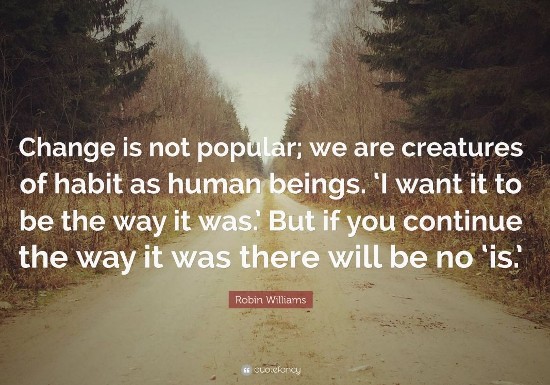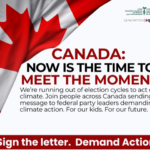The above quote comes from the voice of a comedian, Robin Williams, who sums up one of the greatest challenges we face, our inability to get out of our comfort zone. Looking at today’s headlines, and the threat climate change and the way we have responded points out that the “is” in Williams’ quote may never happen.
And here is another quote I came across in an email recently sent to me.
“If we want a world with a future we cannot use the same thinking that got us here.”
Both Willaims and the author of the above quote are saying something pertinent to our present condition and instrumental to us in beginning to walk down a future path that we need to take now.
It applies to every aspect of “us” and how we interact with each other and the planet. We have to rethink governance models, nationalism, war and the military, energy sources and use, lifestyle choices, how and where we work, our response to climate change, economic disparity, human and planetary health, and our fixation on the divides of race and gender.
“Same thinking” is what is behind the governance models that rule us and determine how our governments work today. Suffice it to say, both the models and the governments based on them are leading us to an unsustainable future.
Governments and Governance Models Fall Short Today
When it comes to government and governance we are surrounded by old thinking. In democracies, the greatest inhibitor to human progress is our short attention span. Here in Canada elections occur around every four years. But that rule is often ignored by the governing party. Canada recently experienced an election a bare two years after the previous one. The end result was to return the government with an almost identical number of seats in Parliament with a cost to the country approaching a half-billion Canadian dollars.
If a four-year cycle for elections seems impossibly short when you need to have continuity in policy and a view to the long term, consider the American system of two-year election cycles for its House of Representatives. No sooner are members of Congress elected before they are out electioneering to be re-elected. How anything meaningful can get done with such discontinuity speaks volumes about the current state of that country’s politics.
In non-democratic countries such as Russia, and China, entrenched leadership appears to be focused more on the self-interest of those governing or their political cliques, cronies, and the parties they lead rather than the needs of citizens.
So many countries in the Global South have flirted with democracy and more often reverted to non-democratic alternatives with rulers entrenching themselves into lifetime dictatorships with some even passing the torch to descendants following the older norm of hereditary monarchies. In many Global South countries, the military is the path to power and leadership. Governments are tossed or overthrown regularly with no regard to what the ideal of governing is all about: human progress.
The bastions of internationalism, bodies like the United Nations, the World Health Organization, and the World Trade Organization, lack the means to establish governing norms to which all nations can ascribe. The end results lead to an endless debate among nations and interest groups that do little to alter the status quo while the planet and humanity move closer to global catastrophe.
The war that Russia has unleashed on Ukraine is evidence of just how our international treaties have failed us. The ideal that is the United Nations with respect for the inviolability of nations is no longer.
As climate change leads to rising food insecurity, droughts, floods, vector-borne disease spread, forced migration, destabilization of national governments, and war between and among nations over the finite resources left to us, what governance and government alternatives are available to help us to a sustainable future as the 21st century unfolds?
New Thinking Can Lead to New Outcomes
Can scrapping the nation-state model of governance which emerged from Europe three centuries ago help us to right the planet? Can our technological acumen as a species rescue us from ourselves?
One trend is becoming abundantly clear. We need government and governance models to reflect the times and challenges we face both locally and collectively.
Does that mean the nation-state has exceeded its expiry date?
Does federalism still make sense or can it be tinkered with to address the asymmetric needs of local entities?
Should we devolve our existing governing entities and convert them to city-states, governments based on watersheds and natural boundary limits, or to communities of common language and cultural heritage?
Would such new constructs produce better solutions leading to better and more sustainable outcomes?
In a previous look at rethinking our governing models, I asked a question. Why is it so difficult to develop new methods of governance and disrupt the status quo?
There is more than one answer.
- Rulers make the rules which make changing the way we are governed go against their self-interest.
- Our laws reflect the way we are governed but seldom keep up with the technological advances in communication and information sharing that are available to us today.
- There is human reluctance and resistance to change based on preconceived ideological positions, and cultural and language differences that further inhibit us.
Technology Can Help to Transcend the Past
The technologies available to us today make it more possible than ever before to reorganize humanity, to change the way we work and interact, and to give us the ability and agility to move and act faster to address the challenges we face in the near future. There has never been a more propitious moment for experimentation. A mix of smaller decision-making bodies for governance, as well as the use of the technological advancements that have turned the planet into a global village, could prove optimal.
Instead of uniformity in decisions over broad geographies, new governing models can help us to focus on solutions to address local needs. Ubiquitous technologies can allow the global community to share its collective wisdom, financial acumen, and resources to direct them to meet local and larger needs.
We are not talking about one type of government model. Instead, it would be a mix and match of cities, rural regions, cultural and language entities and other new geographic and demographic units, some still in need of being defined, that would lead to more responsive governments and the governance models that inhibit us from addressing existential threats like climate change in a timely manner.









